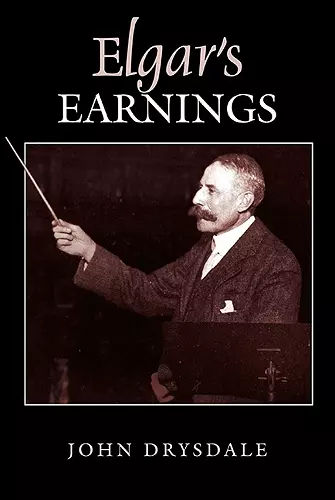Elgar's Earnings
Format:Hardback
Publisher:Boydell & Brewer Ltd
Published:18th Apr '13
Currently unavailable, and unfortunately no date known when it will be back

Although Elgar achieved fame, status and recognition in his lifetime, his earnings did not match the standard of living to which he aspired. The late nineteenth century was a propitious time for British composers. But while the demand from music publishers for their works grew substantially, the copyright and royalty terms were such that even successful composers couldnot achieve the levels of earnings enjoyed by other creative artists such as authors, painters and dramatists. However, in the early twentieth century, new sources of earnings emerged, notably performing fees, broadcasting fees and royalties from record sales. Unlike other leading contemporary British composers, who also held prestigious, salaried positions, Elgar was, by his own volition, a freelance composer who relied entirely on the precarious earnings from his works, supplemented by conducting fees and a brief tenure at Birmingham University. As a result, although Elgar achieved fame, status and recognition in his lifetime, both nationally and internationally, his earnings did not match the standard of living to which he aspired. This lack of money, exacerbated by too much expenditure, was a constant source of worry, complaint and frustration to Elgar, even though he had become a beneficiary fromthe new sources of income in the twentieth century. Elgar's Earnings investigates whether Elgar's complaints about a lack of money can be justified by the facts. Drawing on hitherto neglected primary sources, especially the Novello Business Archive, John Drysdale examines the relatively poor terms offered by music publishers to composers of serious music in general and Elgar in particular and explores the reasons why successful painters and authors, such as G. B. Shaw, could obtain much better terms. This comparative analysis enriches our understanding of the economic and social forces at work in nineteenth and early twentieth century Britain and shows how Elgar, despite his insecure financial position, helped to establish the profession of the English composer, to the lasting benefit of future generations. JOHN DRYSDALE is a musicologist and former investment banker.
A fascinating book ... I commend this book to anyone interested in how composers of the time earned an income. * SPIRITED MAGAZINE, ENGLISH MUSIC FESTIVAL *
This study widens our understanding of the place of Elgar's music in terms of social, cultural and economic context ... Drysdale's excellent analysis of Elgar's earnings shows the benefits that economically-focused studies of composers bring to the more contextual understanding of the life decisions and artistic choices they made. * MUSICAL TIMES, December 2013 *
Drysdale [...] should be congratulated on adding a new chapter in Elgar studies. * MUSICAL OPINION *
This is a rare, maybe even unique, book. [...] An unexpected, revealing, and truly fascinating book and one which I recommend wholeheartedly. * ELGAR SOCIETY JOURNAL *
ISBN: 9781843837411
Dimensions: unknown
Weight: 566g
254 pages